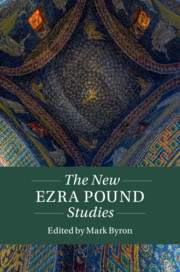Book contents
- The New Ezra Pound Studies
- Twenty-First-Century Critical Revisions
- The New Ezra Pound Studies
- Copyright page
- Contents
- Notes on Contributors
- Key to Abbreviations
- Editor’s Introduction
- Part I Pound’s Texts
- Part II Ezra Pound and Asia
- Part III Culture and Politics
- Chapter 11 The Transnational Turn
- Chapter 12 Pound, Gender, Sexuality
- Chapter 13 Italian Fascism
- Chapter 14 Late Cantos, ‘Aesopian Language’, States’ Rights and John Randolph of Roanoke
- Chapter 15 Copyright
- Chapter 16 The Temple and the Scaffolding
- Afterword
- Index
- References
Chapter 13 - Italian Fascism
from Part III - Culture and Politics
Published online by Cambridge University Press: 17 October 2019
- The New Ezra Pound Studies
- Twenty-First-Century Critical Revisions
- The New Ezra Pound Studies
- Copyright page
- Contents
- Notes on Contributors
- Key to Abbreviations
- Editor’s Introduction
- Part I Pound’s Texts
- Part II Ezra Pound and Asia
- Part III Culture and Politics
- Chapter 11 The Transnational Turn
- Chapter 12 Pound, Gender, Sexuality
- Chapter 13 Italian Fascism
- Chapter 14 Late Cantos, ‘Aesopian Language’, States’ Rights and John Randolph of Roanoke
- Chapter 15 Copyright
- Chapter 16 The Temple and the Scaffolding
- Afterword
- Index
- References
Summary
It is a curious accident of history that 1922 marks the annus mirabilis of both aesthetic modernism and Italian Fascism. Mussolini’s epoch-making March on Rome on 28 October came on the heels of Virginia Woolf’s Jacob’s Room, published by Hogarth Press just two days earlier. Other landmarks of modern art and literature to arrive on the scene that year include T. S. Eliot’s The Waste Land, James Joyce’s Ulysses, Jean Cocteau’s Antigone, Edith Sitwell’s Façade and Pablo Picasso’s Two Women Running on the Beach, to name but a few. None of these modernist mavericks supported Fascism, of course – quite the contrary. Radical politics was stirring nonetheless in the ashes of the First World War. The avant-garde would not remain on the sidelines for long. The Italian Futurists led the way on the right.
- Type
- Chapter
- Information
- The New Ezra Pound Studies , pp. 208 - 226Publisher: Cambridge University PressPrint publication year: 2019

